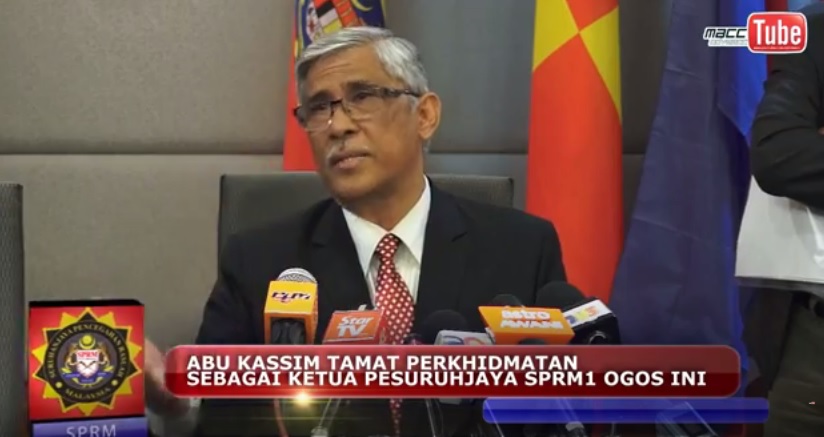
Abu Kassim (File Photo)
PUTRAJAYA: Tan Sri Abu Kassim Mohamed said yesterday there was no pressure from any quarters for him to step down as chief commissioner of the Malaysian Anti-Corruption Commission (MACC) earlier than Dec 4, 2018, when his contract ends.
In fact, he said, it was his third application to end the contract earlier that was approved by the government.
“It was my request. I have said in previous statements that I will not withdraw under pressure. I have stated this many times.
“The application was my request, especially that now I have the chance to serve at the international level, which will promote Malaysia and the MACC to a higher level.
“This is a golden opportunity for me and the country. I cannot just reject it,” he told a special press conference at the MACC headquarters here.
Chief Secretary to the Government Tan Sri Dr Ali Hamsa said in a statement yesterday that Abu Kassim, 55, would not discontinue his service as the MACC chief commissioner on Aug 1 as he had requested.
He said that in accordance with subsection 5(3) of the Malaysian Anti-Corruption Commission Act (Act 694), the Yang di-Pertuan Agong had consented to Abu Kassim’s request to end his service with a month’s notice.
Abu Kassim also said that he was ending his contract because he had accepted an offer from the International Anti-Corruption Academy (IACA) in Austria that comes under the auspices of the United Nations.
He said he would also serve as a lecturer, researcher and consultant at Universiti Teknologi MARA (UiTM).
“I will continue as a government officer until my compulsory retirement on Dec 6, 2020,” said Abu Kassim.
Abu Kassim, who was appointed MACC chief commissioner on Jan 1, 2010, said he was satisfied with all the investigations carried out by the commission, including in high-profile cases, during the six years of his tenure.
He was also satisfied with the transformation carried out by the commission.
“With the cooperation from the MACC officers, the transformation implemented received international recognition because there were obvious changes in the agency’s work culture,” he said.
Asked about his successor, Abu Kassim said that under the MACC Act 2009 (Act 694), the chief commissioner would be appointed by the Yang di-Pertuan Agong upon the advice of the Prime Minister.
“Whoever is fit, proper and good for the organisation will be appointed,” he added.
When asked about the advice he would want to give his successor, Abu Kassim said: “Discharge your duties properly”.
Abu Kassim dismissed speculation that other MACC officers would retire or leave the agency along with him.
“The next person due for mandatory retirement is MACC deputy chief commissioner (operations) Mohd Shukri Abdull, on Oct 3.
“Shukri will attend a course from the end of July until the end of his service. Government servants will usually attend a course that will be helpful to them during retirement,” he said.
Abu Kassim expressed his gratitude to the Yang di-Pertuan Agong for having consented to his requested early termination of contract.
He also thanked the government for having placed the trust in him to carry out his responsibilities over the past six years.
Abu Kassim, who served in the MACC and the Anti-Corruption Agency (ACA) (before Jan 1, 2009) for 32 years, held various positions in the MACC including as investigations officer, Director of the Policy, Research and Planning Division, State ACA Director, and Director of the Malaysian Anti-Corruption Academy.
Besides being active in various anti-corruption activities, Abu Kassim has been a member of the INTERPOL Group of Experts on Corruption (IGEC) since 1997.
He is also involved in the process of preparing the code of ethics for law enforcement, a Best Practices Guide for INTERPOL members, and the Global Standard to Combat Corruption in Police Service.
At the international level, Abu Kassim was at fourth position in the list of 100 persons who are influential in business ethics in 2010 in an index issued by the Ethisphere Institute based in New York. – Bernama
